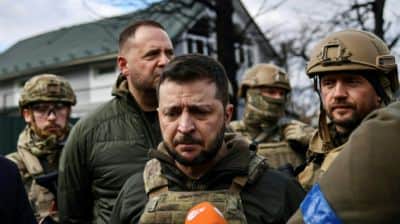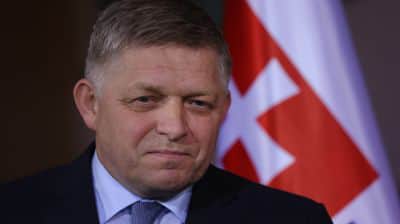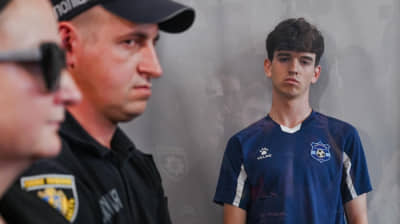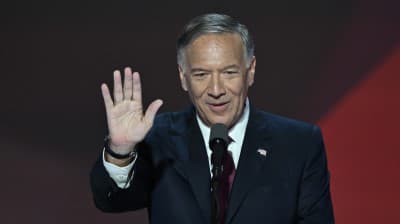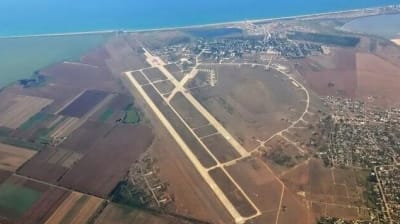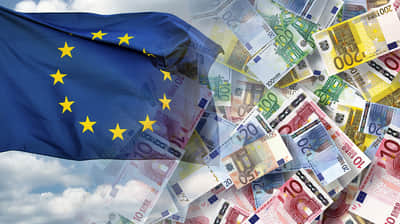Second five points of Peace Formula discussed in Davos
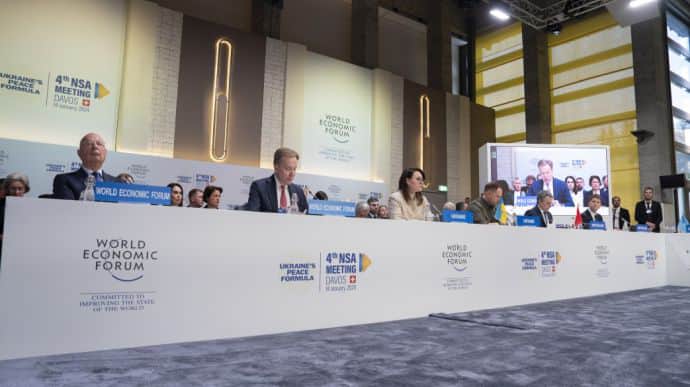
The participants of the meeting in Davos of national security advisers and foreign policy advisers on the implementation of the Peace Formula have considered the second five points of the Ukrainian Peace Formula and the developments in their implementation.
Source: President's website
Details: Earlier, the Office of the President reported that during the third meeting of the advisers in Malta, the first five points of the Ukrainian Peace Formula were considered: nuclear security, food and energy security, release of prisoners and deportees, including children, and restoration of Ukraine's territorial integrity and sovereignty.
On Sunday, the following five points of the Formula were considered: withdrawal of Russian troops and cessation of hostilities, restoration of justice, environmental safety, preventing escalation and repetition of aggression, and confirmation of the end of the war.
Representatives from Lithuania and Rustem Umierov, Ukraine’s Defence Minister, presented the working group's work on the point Withdrawal of Russian troops and cessation of hostilities. In particular, it was proposed to create an international working group at defence minister and national security adviser level, whose tasks would include developing and ensuring the adoption of an international agreement calling on Russia to completely cease hostilities and withdraw its troops from Ukraine.
The Dutch representatives, as well as Andrii Kostin, Prosecutor General, and Iryna Mudra, Deputy Minister of Justice, presented the developments under the item Restoration of Justice.
"To date, we have registered up to 120 thousand incidents of war crimes. We have issued [notices of] suspicion against 477 individuals, indicted 319 and convicted 77 persons. We have diversified our resources and efforts by setting up nine regional war crime units, along with specialised units on central level – addressing conflict-related sexual violence, war-related environmental damage, and deportation of Ukrainian children," Andrii Kostin said.
He also noted that the launch of the International Centre for the Prosecution of the Crime of Aggression is a significant step forward in restoring justice. The final step will be the establishment of a Special Tribunal for the Crime of Aggression.
Representatives of Germany, Finland, and Bulgaria, together with Yuliia Svyrydenko, First Vice Prime Minister of Ukraine, and Ruslan Strilets, Minister of Ecology, presented the working group's findings on Environmental Safety. As the minister said, greenhouse gas emissions caused by the war in Ukraine exceed the total volume of emissions in Austria.
"A year ago, there were 97 million tonnes of CO2 emissions. Today, it is 150 million tonnes of CO2. The world's efforts to achieve climate neutrality have been undermined," he said.
In addition, Strilets said that the water that was lost as a result of the Russians' blowing up the Kakhovka hydroelectric power plant dam would have been enough to provide drinking water for the entire planet for two days.
In view of this, the need to unify the methodology for calculating damage and introduce the definition of "ecocide" into international law was emphasised, which is currently being done by the International Working Group on the Environmental Consequences of War, co-chaired by Andrii Yermak and Margot Wallström, former Deputy Prime Minister and former Foreign Affairs Minister of Sweden.
Wahlström said that the International Working Group on the Environmental Consequences of War will soon present its report, the Environmental Treaty, to Ukrainian President Volodymyr Zelenskyy. This document will contain many specific recommendations for both Ukraine and the international community.
Andrii Yermak, the head of the Office of the President, together with a representative from the United Kingdom, presented the item Preventing escalation and repetition of aggression.
For his part, Ihor Zhovkva noted that the G7 Joint Declaration of Support for Ukraine is the basis for a new comprehensive system to prevent the escalation of war and the repetition of aggression. Currently, 15 more countries have confirmed their interest in starting bilateral consultations on security guarantees for Ukraine.
Andrii Sybiha, Deputy Head of the Office of the President, and Denys Maliuska, Ukraine’s Minister of Justice, presented the working group's work on the implementation of point 10 - Confirmation of the end of the war.
Maliuska reiterated that Ukraine has repeatedly tried to negotiate with Russia on mutual relations and draw up a relevant international agreement, and each time Russia has stopped implementing it and simply ignored it. This applies to the agreement on the common border, the "great" treaty on friendship and cooperation, the Budapest Memorandum, the Minsk agreements, and even the Pereiaslav Articles of 1659.
"We have learned from past mistakes. The treaty that will confirm the end of the war must be based on the Peace Formula, be multilateral, i.e. signed not only by Ukraine and Russia, but also by the guarantor countries, be comprehensive and regulate all areas affected by the war. The terms of the treaty must be clear and legally binding, and the treaty itself must be ratified by the parliaments of the participating countries," the Minister stressed.
In addition, the event included two special discussion sessions on food security and humanitarian issues of the war, which were already presented during the third meeting in Malta.
Dmytro Lubinets, the Ukrainian Parliament Commissioner for Human Rights, and Baroness Helena Kennedy, co-chair of the Bring Kids Back UA High-Level International Expert Group, spoke at the special session on Humanitarian Issues about the struggle to return Ukrainian children forcibly displaced or deported by Russia, illegally abducted and imprisoned civilians, and prisoners of war.
"According to official data, Russia has deported or forcibly displaced more than 19,500 Ukrainian children. So far, only 517 children have been returned home. As for adults, 2828 Ukrainians have returned to Ukraine, including only 150 civilians. Our task is to return [bring back] everyone! Therefore, the international community must immediately consolidate its efforts in this direction!" emphasised Lubinets.
Support UP or become our patron!
